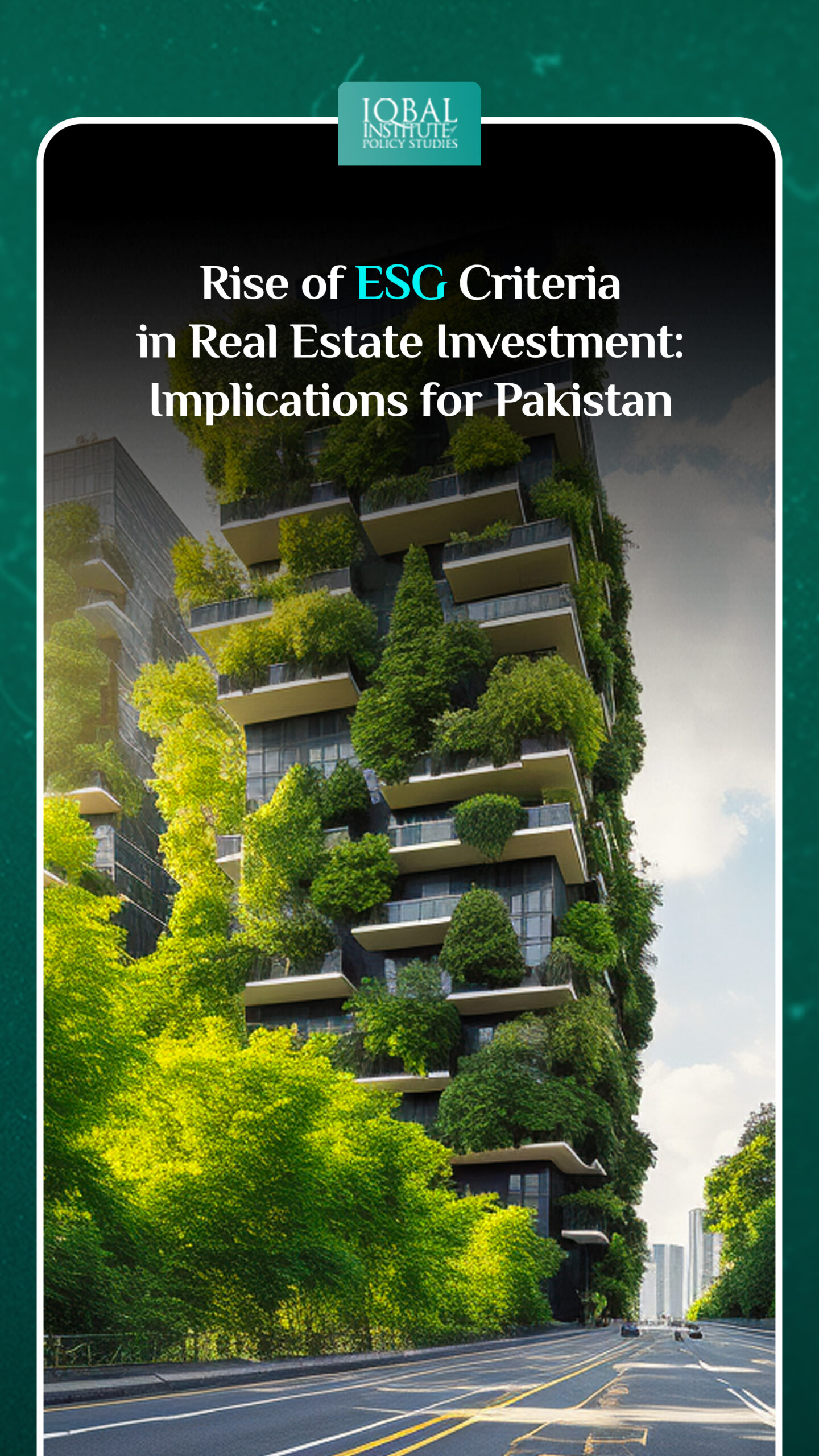In an era defined by rapidly evolving global priorities, the investment landscape is undergoing a profound metamorphosis. Traditional metrics are no longer the sole barometer for evaluating investment potential. Enter Environmental, Social, and Governance (ESG) criteria – a set of holistic benchmarks that go beyond financial considerations and delve into an investment’s environmental impact, social responsibility, and governance practices. This transformative shift towards sustainable and responsible investing is not confined to conventional sectors; it has transcended into the realm of real estate, a trend with far-reaching implications, even for a nation like Pakistan.
Understanding ESG Criteria
ESG criteria serve as a comprehensive framework for assessing an investment’s environmental impact, social responsibility, and governance practices. These non-financial metrics provide insights into the long-term sustainability and ethical practices of an investment. The three main components of ESG criteria are as follows:
Environmental Factors
These factors evaluate the ecological impact of an investment. They include energy efficiency, carbon emissions, water management, waste disposal, and the incorporation of green building practices.
Social Factors
Social considerations encompass the investment’s effect on society. This entails community engagement, labor practices, health and safety measures, diversity and inclusivity initiatives, and the overall societal impact.
Governance Factors
Governance criteria assess the quality and effectiveness of an investment’s leadership. This includes transparency, risk management, ethical behavior, and the adherence to sound corporate governance practices.
ESG Integration in Real Estate Investment
Throughout history, real estate investment has frequently been entwined with environmental concerns due to its substantial consumption of resources and consequential carbon emissions. However, a discernible shift is underway, driven by the growing integration of ESG criteria, which is fundamentally redefining the sector’s trajectory. This transformative journey is steering real estate towards sustainable practices that not only mitigate its environmental impact but also generate positive social outcomes.
One pivotal aspect of this transformation is the emphasis on green building and energy efficiency. Real estate projects that harmonize with ESG principles are prioritizing the creation of green buildings, often validated through distinguished programs like LEED or BREEAM. These esteemed certifications not only bear testimony to the property’s commitment to energy efficiency but also its dedication to fostering an eco-friendly footprint. In doing so, these projects achieve a two-fold triumph: diminished operational costs and a markedly reduced carbon footprint.
Moreover, ESG-conscious real estate investment extends its influence beyond mere physical structures, embracing the notion of social impact and inclusivity. This dynamic approach endeavors to craft spaces that transcend conventional boundaries, catering not just to the occupants but also making a meaningful contribution to the broader community. This endeavor is illuminated through the promotion of mixed-use developments, the provision of affordable housing solutions, and tqhe seamless integration of verdant spaces. These green havens do not merely augment the aesthetic appeal of the surroundings; they nurture the holistic well-being of the inhabitants, fostering a sense of unity, tranquility, and harmony within the community.
Underpinning these transformations is the critical foundation of governance and transparency, which has emerged as a linchpin of ESG integration in real estate investment. The value of effective governance lies not just in its capacity to ensure the ethical fabric of an investment but also in its ability to engender transparency and accountability in decision-making processes. Projects that align with ESG values proudly showcase their sturdy governance structures and unwavering commitment to ethical practices. Such a commitment resonates deeply with ESG-minded investors, prompting their heightened engagement and endorsement of real estate endeavors that embody integrity and ethical conduct.
Implications for Pakistan
The real estate sector holds immense significance in Pakistan’s economy, but it faces multifaceted challenges ranging from rapid urbanization and inadequate infrastructure to environmental degradation. Incorporating ESG criteria into the sector could yield a multitude of positive implications for the country:
Sustainable Urban Development
Embracing ESG principles can catalyze sustainable urban planning. This entails efficient land use, reduced pollution, improved infrastructure, and greater resilience to environmental challenges.
Energy Efficiency
Given Pakistan’s persistent energy crisis, ESG-driven real estate projects could significantly contribute to energy efficiency by incorporating renewable energy sources and energy-saving technologies.
Socially Responsible Projects
The adoption of ESG criteria encourages real estate developers to design projects that cater to the needs of diverse societal segments, promoting inclusivity and enhancing access to affordable housing.
Attracting Foreign Investment
As global investors place increasing importance on ESG factors, Pakistan’s alignment with these criteria can attract international capital to its real estate sector, stimulating economic growth.
Long-Term Value Creation
ESG-focused projects often yield enduring value by ensuring the resilience of assets amid evolving environmental and social dynamics.
Challenges and the Path Forward
The integration of ESG criteria into Pakistan’s real estate sector may encounter challenges, including limited awareness, a lack of robust regulatory frameworks, and the initial costs associated with sustainable practices. However, through stakeholder engagement, collaboration between public and private sectors, and the provision of incentives, these challenges can be addressed and surmounted.
Conclusion
The ascent of ESG criteria within real estate investment heralds a global transition toward sustainable and ethical business practices. In Pakistan, the real estate sector stands to gain significantly from the incorporation of these criteria, contributing to environmental preservation, societal well-being, and enhanced governance. By embracing ESG principles, Pakistan can position itself as a responsible and attractive hub for real estate investment in the years ahead, leading to a brighter, more sustainable future for the nation.
This article is written by Maha Nazami. Maha is a research analyst at the Iqbal Institute of Policy Studies (IIPS).



Leave a Reply